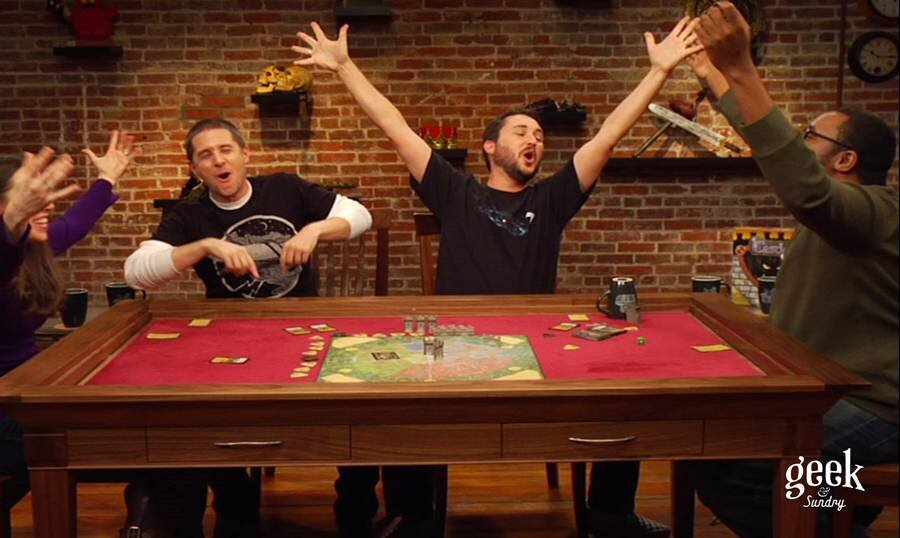How designing board games can make you a better lover.
Romance your players!
Dating, game design, same agenda, same thing. Get better at one and you’ll get better at the other.
First, you are no longer merely a player. You are a designer. You are not the one out to score, not about the win. If someone does win, it is your job to make sure the one who didn’t win didn’t lose by playing.
You are there to help everyone have a good time, an enriching experience, emotional fulfilment, regardless of the outcome. Apply this later to your own social life, and the ladies, they will come back for more. Oh yes they will.
Of course, there is a ‘win’ in games, else it’s not much of a game. You solve the problem, and it is an essential part of the experience, but this just leads to the main tenet of this piece: The score is part of the experience, but not the most important part.
Give it up, uncle.
Monopoly, for example, is a bad date. Like one derived from too many bad 80s teen films. One person happy, all others miserable. One person gloating their victory, others jilted at various stages of the evening. Trapped on a linear track, bound by chance, your influence being handed over to the tyrant across the table, the only interaction is when someone is trying to shaft you, and you find that what was built up in hope is entirely lost by the end.
There is little enjoyable about being on a Monopoly date. It’s a bit of a sleaze. All money-grubbing selfishness. No manners at all.
On the other hand, Small World is a wonderful date.
Designed just six years ago by Phillipe Keyaerts of Belgium, Small World takes you to an open map of areas, with dozens of mix-and-match combinations of races. You can start on any edge, move in whichever direction you choose, and take up any character you think will get you through the experience.
Smallworld. Such a good date.
Roll in Undead trolls from the North, or Flying Amazonians from the West. Options abound of where to go and what to do. Rich in atmosphere, you feel the fantasy, and your empire, your stock grows well before anyone incurs on anyone else’s territory.In the end, sure, somebody won, but since everyone enjoyed the experience and felt more empowered than before they started, really everyone won.In the end, sure, somebody won, but since everyone enjoyed the experience and felt more empowered than before they started, really everyone won.
Smallworld. So much expression!
Imagine a date like that. No, imagine designing a style of date where people around the world can have a good time because of your skill in designing it.Small World: Good date. Next time you’re in Belgium, ladies, look up Philippe Keyaerts for a nice night out. But enough flirting, let’s break it down:
The components of a game are the bits you design (Mechanics/Setting), then the interaction (Dynamics), leading to a positive emotional outcome (Aesthetics), and all supporting a Theme.The extra, often underregarded component is the players around the table, what I like to call Context.
First date: Coffee for context
Context in a game is not about the game. It is about the people at the table and what happened to bring them here. Who are they? What are they like? What are they doing at this table?In date terms, you get to know someone, just chatting, perhaps over coffee. Nothing deep, just getting to know you, and thinking about where the second date might go.
A game that does this and only this is an icebreaker. A party game to get people to know each other. Twister, Scruples, Pictionary. You can assess their character pretty well if they actually try to win Twister.So that’s your aim – build connection. Context. Everyone knows each other better now, and that’s what matters. You could stop there for a party game, or move on to:
Second date: Testing the waters with Mechanics
Barry White
Mechanics are the rules by which you play a game. It is your job to write them.Hopefully by now you know your audience, what kind of experience you would think they would enjoy. You have a stock of options available to you, and you must choose just a few.
So you choose a second date. Try something out. Did she seem like the sort of person who would like parks or pizza? Recitals or rockclimbing? Deckbuilding or drafting? Agent placement or action points? Choose and try, and watch carefully for the emotional response, to see if it is the response you are after, make adjustments, and repeat.This is playtesting. Building knowledge about what your intended players would enjoy. The good news is that in designing a game, you can replay the second date over and over until you get the formula right. The tough news is that you are arranging the dates of hundreds of people you haven’t even met, so you’d better test it pretty well.But let’s assume you have found the right combination for your audience. Chatting over wine by the sea, perhaps? Great. Love is in the air. Time to step it up.
Third date: Flirting with dynamics
By modern standards, if you are up to the third date and you haven’t had at least a partial ‘win’, you’re moving pretty slowly, but let’s assume the conservative approach all the same.
Other times, more so.
Dynamics is the interplay. How players interact with each other. You see each other’s values in how they treat each other.
Again, why Monopoly is so bad is that you have only one mode available – trade, strangle, crush. No wonder it makes enemies.
But, again, in Small World, there is room to express competitive play to one player, but compassion to another. Fairness and bastardry. Your personality will come through as you attack Ralph because he attacked you with a hoard of Ratmen, team up with Dave, but leave Dana alone because it is her first game.
All the ambition, compassion, spite and love will come through.
And I have just watched an episode of TableTop where over a game of Fortune and Glory, Felicia decided not to ruin Will’s evening (again) due to pity and compassion, and to get back at her brother, who had played a nasty card early on.
https://www.youtube.com/watch?v=rQMuu_7jn2I
On the date, your datees are expressing desires, tastes, values, insecurities, ambitions and vulnerabilities through flirting, and feeling out for the response. Deeper and more intimate values are not just talked about, but demonstrated and seeing each other’s physical banter.
Yes! Now you can look at getting down to it! It’s not about ‘waiting to see if he’s really into me’ or anything else that youngsters believe, it’s about knowing each other well enough and deep enough to enjoy it!Your game dynamics – flirting! You have your people interacting with each other, either sharing the highs and lows of fortune together, negotiating, trading, contesting, supporting and cajoling. Satisfying emotions ensue, no matter who wins.And sure, we could leave it there, and abstracts can endear for a while. Maybe your players’ mutual characters will allow a classic game to endure. Chess, Bridge and Go all have enough scope to allow the play of dynamics, but there is yet another layer to reach all the way from designer to the players’ emotions:
Part 4: Setting. Characters. Fantasy. Rrrrrrromance.
A good tool with which to rip bodices.
You KNOW that you are pushing little pieces of cardboard across a table, but you want to believe that you are doing something else. You are invading Spain with an army of Amazonians, you are Lucy Lawless in battle armour kneecapping a frost giant, you are a pharaoh of Egypt, fending off an invasion force from Saturn.Fantasy. The fuel of long-term love. A Spanish restaurant, a dark theatre piece, an exotic film, a dress-up party. All these can give some fantasy to run through her mind to replace reality, emptying all those mundane thoughts and allowing enticing images to reach emotional highs that you can’t do alone.
In a game, the setting – reinforced by all the tangible, visual, auditory… olfactory… elements of your game – reaches straight into the imagination of the players, allows you to excite their moods to get them in the right frame of mind to enjoy the rest of the game experience so much more.It becomes about so much more than merely …the movement of a bishop.
So, the lessons that you can take on your own date are that you are not there to conquer, defeat, diminish, trick or take anything away from the person you fancy. You are there to give each of you a nice time, to have a socially engaging and emotionally uplifting evening that otherwise might not have been. So to offer that, you both end with more than you started, and you’re likely to score after all.
We aim to build a happy, emotionally rich relationship between our players that keeps them coming back to the table for this or the next game. Have a relationship with your players. Take them from context to fantasy, from coffee to romance.
For the win.







